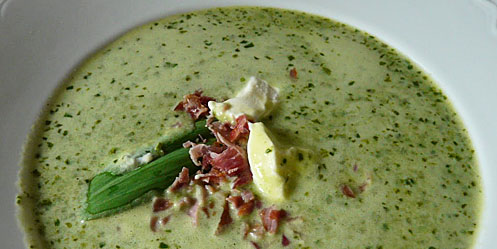Philipp Alexander Schmitt, one of our Tour Leaders in Germany and Spain, recently shared his version of Bear Garlic Soup which some of our travelers will remember fondly from their adventure Bicycling Bavaria’s Back Roads.
Bear garlic is also known as ramsons, buckrams, wild garlic, broad-leaved garlic or wood garlic. Its leaves have a mild flavor with a hint of garlic and can be used as salad, spice, boiled as a vegetable in soup, or as a delicious alternative for basil in pesto. The bulb and flower can also be eaten.
Cows that have fed on ramsons give milk that tastes slightly of garlic, and butter made from this milk was very popular in 19th century Switzerland.
Ramsons or Bear Garlic Soup
Ingredients for 4 People
2 large potatoes – peeled and diced
1 diced onion
1 tablespoon of butter
2-2 ½ cups of vegetable stock
1 cup of dry white wine (Grau Burgunder)
4 or 5 ounces of bear’s garlic
some parsley
4 slices of bacon
salt and pepper
7 ounces of creme fraiche or whipped cream
Melt the butter in a pot and add the diced onion and potatoes. When the onions begin to change color add the wine and then the vegetable stock. Let everything boil for 10 minutes (or until the potatoes are done).
Meanwhile wash the bear garlic and the parsley removing the stems and put 4-6 leaves of bear garlic aside for garnish. You can use whole leaves for the garnish or mince if you prefer.
Add the rest of the bear garlic and parsley to the stock, as well as the creme fraich (if you can’t find creme fraiche you can substitute slightly whipped heavy cream). Reserve some creme fraiche for garnishing.
Fry the bacon until it is crispy then use a paper towel to remove excess grease and crumble.
Put the soup in serving bowls and garnish with creme fraiche, bacon and bear garlic leaves.
Serve with a dry German Grauburgunder wine which is actually made from the same grape as an Italian Pinot Grigio or a French Pinot Gris – but the difference in climate gives a very distinct German taste.
Guten Appetit!


